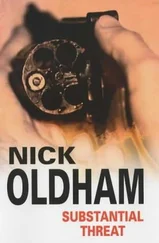‘I know, all right? It’s post-Sov stuff,’ Kershaw grumbled. ‘There’s a real fine line between government and crooks over there at the best of times, and you did not hear me say that because I greatly respect my colleagues from Kiev and their massive integrity, even if they do occasionally poison the shit out of one another as part of the natural flow of democratic give and take. If there is anyone in the world more fucked in the head than you Brits, which I doubt, it’s those assholes. They would totally send a guy like that out into the real world. Although the other thing is, maybe Arno just didn’t want someone to blow up the hospital. And I would be totally fine with that logic right now.’
That was something the Sergeant had not even considered. Pechorin might be a target. He knew things, for sure, that the Sergeant wanted to know. I should have kept hold of him. But if he was disposed to tell me he would have, and if he wasn’t I’d be abducting an officer of NatProMan for a hostile interrogation, and London would not be standing foursquare behind me on that decision. Above my paygrade, outside my need to know.
He was really tired now. How long had it been since he’d slept through the night without fresh bruises? Since he’d just had a cup of tea and a slice of cake?
Kershaw’s tone changed, warmed. ‘You did good these nights, Lester. Really good. I’m writing a report. You know what Dirac did after he came to you?’
‘Sat around and drank booze, I think.’
‘Jesus, that guy. He’s like a rescue dog in reverse. Okay, I’ll put “probably stinko”.’
‘All right, Jed. I’ve got to go. Tell Arno I’m still around to consult if he’s got time. And thank him for me.’
‘Thank him?’
‘He did me a favour. Personal thing, but it meant a lot.’
‘I will. Oh, Lester?’
‘Yes?’
‘Is it possible that you are schtupping Kaiko Inoue?’
‘You mean Doctor Inoue?’
‘Oh, fine, be like that.’
The red phone rang just as he was getting up. He lifted it and the secretary said ‘Hold for Africa’ in a voice which suggested ‘Into Thy hands, O Lord’.
The Sergeant said, ‘Okay.’
Africa said: ‘Ferris.’
‘Here.’
‘Why have you pissed in my mead bowl?’
He had never heard this expression. ‘What?’
‘My mead bowl. My sweet ambrosia, if you prefer. My wine glass. It doesn’t really matter, Lester: what I want to know is why you have got up on the table, dropped your trousers, and pissed in it in front of my fucking face?’ He found it hard to understand that she had sworn at him. She was not that person. She must know those words, but that she might use them in anger had never occurred to him.
But there was no question that she had. Fury bubbled in her as she went on. ‘If that doesn’t clarify matters, let me rephrase the question: did I tell you not to talk to reporters?’
Oh.
‘Yes, ma’am.’
‘And did you happen, in spite of this, to give an interview to an eel-faced little bitch called Hasp? About, I would imagine, twenty minutes ago? So it can’t have slipped your mind.’
‘I didn’t know she was interviewing me. And I said it was a personal opinion.’
‘You don’t have personal opinions, Lester! You’re standing in the house, wearing the bloody hat! You are Britain! Do you understand? You are your country, you are your uniform, and you are me!’
From nowhere, it rose in him, unexpected. ‘I thought you were Africa.’ He heard her hiss, hurried on. ‘I mentioned one issue which is not a major part of the picture here in response to a query I took to be off the record.’
‘She is a journalist, Sergeant Ferris. Nothing is off the record if she is within earshot. The interview is happening if she is in the room. The camera is always rolling. The microphone is always live. So now your interview is up. The audio is on the Internet. Your little informal chat is playing, on a loop, on her nasty little news channel. You have added to the burden of what was already shaping up to be a shitty day and I am unhappy with you. Do you understand?’
‘Yes, ma’am.’
‘And with reference to this specific issue?’
‘Ma’am.’
‘It is a non-topic. You have no opinion on it, personal or otherwise. Like everything else on Mancreu, it is invisible. All things there are invisible but some things are more invisible than others. Like this. Is that clear?’
‘Yes, ma’am.’
‘Because if it’s not clear, Lester, then get a sewing kit and just stitch your fucking mouth closed for the duration. You can eat through a straw. All right?’
She hung up before he could say ‘Ma’am.’
More invisible than others.
He sat with the phone in his hands, and knew that he had reached the end of reasonable hesitation. There were two more things which might be permitted to him by integrity before he had to act, or not act, and bear the consequences of the choice. The first thing he might do was go to the headland and look out at the Bay of the Cupped Hands, really look, and see what it was he had ignored since his booted foot first touched the grimy dockside of Port de Beauville, since the Consul had met him and taken his hand.
‘It’s a good place,’ the man had said. ‘No, no, keep looking at me and pretend we’re exchanging information of towering importance. That’s it. Yes, as I say: you’ll like it here. But don’t get involved. The sheer appalling fuckup of it will eat you alive. Just sit on the veranda and finish the booze. I’ve laid in extra. That fellow Kershaw’s all right — you’ll meet him later. Looks like a rodent, but he knows what food should taste like. Don’t in the name of God let him talk to you about the war.’
‘Which one?’
‘Any of them, but most particularly the one with the Nazis. He has that extraordinary idea that the Americans saved us out of the kindness of their hearts rather than us digging in for two long years while they tried to pretend they weren’t involved. Oh, no, don’t look at the ships out there, the locals consider it rude, just keep your eyes on me. That’s right.’
And he, bewildered and barely out of bed, had taken that at face value and never questioned it, had shaped his world around it because it was Mancreu’s underpinning, like the dog beneath the flea. Don’t look at the ships .
So now he might go to the headland and say, ‘I see you.’ A formal declaration. He had done it before, elsewhere: stared into the dark or the mountains or the sand and made some sort of pledge, given himself a goal or issued a warning. ‘I will bring you home’; ‘I know you’re out there.’
But the Fleet would not hear him and in any case it wasn’t the ships out there he had to acknowledge. It was the ones here, in Brighton House, at the back of the comms room.
The comms room desk was a nasty, modern thing, more a trestle table with a laminate top. It was covered in a hotchpotch of digital technology: two phones, an actual one-time pad, a desktop computer and a large brick of plastic which was copier, scanner, fax and printer. The chair in front of it resembled some sort of gibbet or mechanical stork, but was surprisingly cosy with a fleecy airline blanket draped over it. Two desklamps sat at either end of the trestle like bookends, defining the world — and if you turned towards the door they threw a stark shadow from the reinforced lintel across the wall, reminding you that, yes, the comms room could withstand a significant amount of punishment before any hostile force gained entry, giving you time to destroy the files.
And what files would those be? What, on Mancreu, could still be important enough to worry about? The ones in the inappropriately cheery orange filing cabinet — with built-in hard drive and shock-protected battery power supply — in the far corner. The copies of the daily correspondence arriving by email and encrypted transfer, and occasionally by courier pouch, which the Sergeant routinely stamped and put away but did not ever read. The bureaucratic echo of the actual Fleet and the legal niceties surrounding it, all indexed and — there was no verb, he realised, or not one that he knew, for the modern process of tagging with keywords. Indexed, then, and categorised, and sitting there like a crab bloated with rotten fish and carrion.
Читать дальше
Конец ознакомительного отрывка
Купить книгу











